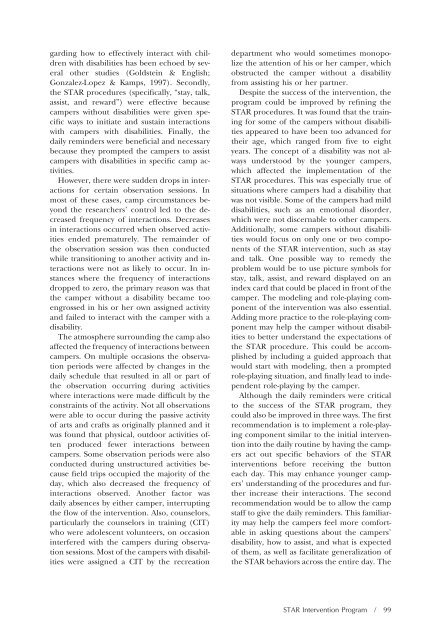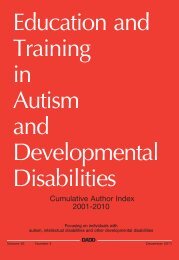Download the Journal (PDF) - Division on Autism and ...
Download the Journal (PDF) - Division on Autism and ...
Download the Journal (PDF) - Division on Autism and ...
You also want an ePaper? Increase the reach of your titles
YUMPU automatically turns print PDFs into web optimized ePapers that Google loves.
garding how to effectively interact with children<br />
with disabilities has been echoed by several<br />
o<str<strong>on</strong>g>the</str<strong>on</strong>g>r studies (Goldstein & English;<br />
G<strong>on</strong>zalez-Lopez & Kamps, 1997). Sec<strong>on</strong>dly,<br />
<str<strong>on</strong>g>the</str<strong>on</strong>g> STAR procedures (specifically, “stay, talk,<br />
assist, <strong>and</strong> reward”) were effective because<br />
campers without disabilities were given specific<br />
ways to initiate <strong>and</strong> sustain interacti<strong>on</strong>s<br />
with campers with disabilities. Finally, <str<strong>on</strong>g>the</str<strong>on</strong>g><br />
daily reminders were beneficial <strong>and</strong> necessary<br />
because <str<strong>on</strong>g>the</str<strong>on</strong>g>y prompted <str<strong>on</strong>g>the</str<strong>on</strong>g> campers to assist<br />
campers with disabilities in specific camp activities.<br />
However, <str<strong>on</strong>g>the</str<strong>on</strong>g>re were sudden drops in interacti<strong>on</strong>s<br />
for certain observati<strong>on</strong> sessi<strong>on</strong>s. In<br />
most of <str<strong>on</strong>g>the</str<strong>on</strong>g>se cases, camp circumstances bey<strong>on</strong>d<br />
<str<strong>on</strong>g>the</str<strong>on</strong>g> researchers’ c<strong>on</strong>trol led to <str<strong>on</strong>g>the</str<strong>on</strong>g> decreased<br />
frequency of interacti<strong>on</strong>s. Decreases<br />
in interacti<strong>on</strong>s occurred when observed activities<br />
ended prematurely. The remainder of<br />
<str<strong>on</strong>g>the</str<strong>on</strong>g> observati<strong>on</strong> sessi<strong>on</strong> was <str<strong>on</strong>g>the</str<strong>on</strong>g>n c<strong>on</strong>ducted<br />
while transiti<strong>on</strong>ing to ano<str<strong>on</strong>g>the</str<strong>on</strong>g>r activity <strong>and</strong> interacti<strong>on</strong>s<br />
were not as likely to occur. In instances<br />
where <str<strong>on</strong>g>the</str<strong>on</strong>g> frequency of interacti<strong>on</strong>s<br />
dropped to zero, <str<strong>on</strong>g>the</str<strong>on</strong>g> primary reas<strong>on</strong> was that<br />
<str<strong>on</strong>g>the</str<strong>on</strong>g> camper without a disability became too<br />
engrossed in his or her own assigned activity<br />
<strong>and</strong> failed to interact with <str<strong>on</strong>g>the</str<strong>on</strong>g> camper with a<br />
disability.<br />
The atmosphere surrounding <str<strong>on</strong>g>the</str<strong>on</strong>g> camp also<br />
affected <str<strong>on</strong>g>the</str<strong>on</strong>g> frequency of interacti<strong>on</strong>s between<br />
campers. On multiple occasi<strong>on</strong>s <str<strong>on</strong>g>the</str<strong>on</strong>g> observati<strong>on</strong><br />
periods were affected by changes in <str<strong>on</strong>g>the</str<strong>on</strong>g><br />
daily schedule that resulted in all or part of<br />
<str<strong>on</strong>g>the</str<strong>on</strong>g> observati<strong>on</strong> occurring during activities<br />
where interacti<strong>on</strong>s were made difficult by <str<strong>on</strong>g>the</str<strong>on</strong>g><br />
c<strong>on</strong>straints of <str<strong>on</strong>g>the</str<strong>on</strong>g> activity. Not all observati<strong>on</strong>s<br />
were able to occur during <str<strong>on</strong>g>the</str<strong>on</strong>g> passive activity<br />
of arts <strong>and</strong> crafts as originally planned <strong>and</strong> it<br />
was found that physical, outdoor activities often<br />
produced fewer interacti<strong>on</strong>s between<br />
campers. Some observati<strong>on</strong> periods were also<br />
c<strong>on</strong>ducted during unstructured activities because<br />
field trips occupied <str<strong>on</strong>g>the</str<strong>on</strong>g> majority of <str<strong>on</strong>g>the</str<strong>on</strong>g><br />
day, which also decreased <str<strong>on</strong>g>the</str<strong>on</strong>g> frequency of<br />
interacti<strong>on</strong>s observed. Ano<str<strong>on</strong>g>the</str<strong>on</strong>g>r factor was<br />
daily absences by ei<str<strong>on</strong>g>the</str<strong>on</strong>g>r camper, interrupting<br />
<str<strong>on</strong>g>the</str<strong>on</strong>g> flow of <str<strong>on</strong>g>the</str<strong>on</strong>g> interventi<strong>on</strong>. Also, counselors,<br />
particularly <str<strong>on</strong>g>the</str<strong>on</strong>g> counselors in training (CIT)<br />
who were adolescent volunteers, <strong>on</strong> occasi<strong>on</strong><br />
interfered with <str<strong>on</strong>g>the</str<strong>on</strong>g> campers during observati<strong>on</strong><br />
sessi<strong>on</strong>s. Most of <str<strong>on</strong>g>the</str<strong>on</strong>g> campers with disabilities<br />
were assigned a CIT by <str<strong>on</strong>g>the</str<strong>on</strong>g> recreati<strong>on</strong><br />
department who would sometimes m<strong>on</strong>opolize<br />
<str<strong>on</strong>g>the</str<strong>on</strong>g> attenti<strong>on</strong> of his or her camper, which<br />
obstructed <str<strong>on</strong>g>the</str<strong>on</strong>g> camper without a disability<br />
from assisting his or her partner.<br />
Despite <str<strong>on</strong>g>the</str<strong>on</strong>g> success of <str<strong>on</strong>g>the</str<strong>on</strong>g> interventi<strong>on</strong>, <str<strong>on</strong>g>the</str<strong>on</strong>g><br />
program could be improved by refining <str<strong>on</strong>g>the</str<strong>on</strong>g><br />
STAR procedures. It was found that <str<strong>on</strong>g>the</str<strong>on</strong>g> training<br />
for some of <str<strong>on</strong>g>the</str<strong>on</strong>g> campers without disabilities<br />
appeared to have been too advanced for<br />
<str<strong>on</strong>g>the</str<strong>on</strong>g>ir age, which ranged from five to eight<br />
years. The c<strong>on</strong>cept of a disability was not always<br />
understood by <str<strong>on</strong>g>the</str<strong>on</strong>g> younger campers,<br />
which affected <str<strong>on</strong>g>the</str<strong>on</strong>g> implementati<strong>on</strong> of <str<strong>on</strong>g>the</str<strong>on</strong>g><br />
STAR procedures. This was especially true of<br />
situati<strong>on</strong>s where campers had a disability that<br />
was not visible. Some of <str<strong>on</strong>g>the</str<strong>on</strong>g> campers had mild<br />
disabilities, such as an emoti<strong>on</strong>al disorder,<br />
which were not discernable to o<str<strong>on</strong>g>the</str<strong>on</strong>g>r campers.<br />
Additi<strong>on</strong>ally, some campers without disabilities<br />
would focus <strong>on</strong> <strong>on</strong>ly <strong>on</strong>e or two comp<strong>on</strong>ents<br />
of <str<strong>on</strong>g>the</str<strong>on</strong>g> STAR interventi<strong>on</strong>, such as stay<br />
<strong>and</strong> talk. One possible way to remedy <str<strong>on</strong>g>the</str<strong>on</strong>g><br />
problem would be to use picture symbols for<br />
stay, talk, assist, <strong>and</strong> reward displayed <strong>on</strong> an<br />
index card that could be placed in fr<strong>on</strong>t of <str<strong>on</strong>g>the</str<strong>on</strong>g><br />
camper. The modeling <strong>and</strong> role-playing comp<strong>on</strong>ent<br />
of <str<strong>on</strong>g>the</str<strong>on</strong>g> interventi<strong>on</strong> was also essential.<br />
Adding more practice to <str<strong>on</strong>g>the</str<strong>on</strong>g> role-playing comp<strong>on</strong>ent<br />
may help <str<strong>on</strong>g>the</str<strong>on</strong>g> camper without disabilities<br />
to better underst<strong>and</strong> <str<strong>on</strong>g>the</str<strong>on</strong>g> expectati<strong>on</strong>s of<br />
<str<strong>on</strong>g>the</str<strong>on</strong>g> STAR procedure. This could be accomplished<br />
by including a guided approach that<br />
would start with modeling, <str<strong>on</strong>g>the</str<strong>on</strong>g>n a prompted<br />
role-playing situati<strong>on</strong>, <strong>and</strong> finally lead to independent<br />
role-playing by <str<strong>on</strong>g>the</str<strong>on</strong>g> camper.<br />
Although <str<strong>on</strong>g>the</str<strong>on</strong>g> daily reminders were critical<br />
to <str<strong>on</strong>g>the</str<strong>on</strong>g> success of <str<strong>on</strong>g>the</str<strong>on</strong>g> STAR program, <str<strong>on</strong>g>the</str<strong>on</strong>g>y<br />
could also be improved in three ways. The first<br />
recommendati<strong>on</strong> is to implement a role-playing<br />
comp<strong>on</strong>ent similar to <str<strong>on</strong>g>the</str<strong>on</strong>g> initial interventi<strong>on</strong><br />
into <str<strong>on</strong>g>the</str<strong>on</strong>g> daily routine by having <str<strong>on</strong>g>the</str<strong>on</strong>g> campers<br />
act out specific behaviors of <str<strong>on</strong>g>the</str<strong>on</strong>g> STAR<br />
interventi<strong>on</strong>s before receiving <str<strong>on</strong>g>the</str<strong>on</strong>g> butt<strong>on</strong><br />
each day. This may enhance younger campers’<br />
underst<strong>and</strong>ing of <str<strong>on</strong>g>the</str<strong>on</strong>g> procedures <strong>and</strong> fur<str<strong>on</strong>g>the</str<strong>on</strong>g>r<br />
increase <str<strong>on</strong>g>the</str<strong>on</strong>g>ir interacti<strong>on</strong>s. The sec<strong>on</strong>d<br />
recommendati<strong>on</strong> would be to allow <str<strong>on</strong>g>the</str<strong>on</strong>g> camp<br />
staff to give <str<strong>on</strong>g>the</str<strong>on</strong>g> daily reminders. This familiarity<br />
may help <str<strong>on</strong>g>the</str<strong>on</strong>g> campers feel more comfortable<br />
in asking questi<strong>on</strong>s about <str<strong>on</strong>g>the</str<strong>on</strong>g> campers’<br />
disability, how to assist, <strong>and</strong> what is expected<br />
of <str<strong>on</strong>g>the</str<strong>on</strong>g>m, as well as facilitate generalizati<strong>on</strong> of<br />
<str<strong>on</strong>g>the</str<strong>on</strong>g> STAR behaviors across <str<strong>on</strong>g>the</str<strong>on</strong>g> entire day. The<br />
STAR Interventi<strong>on</strong> Program / 99
















